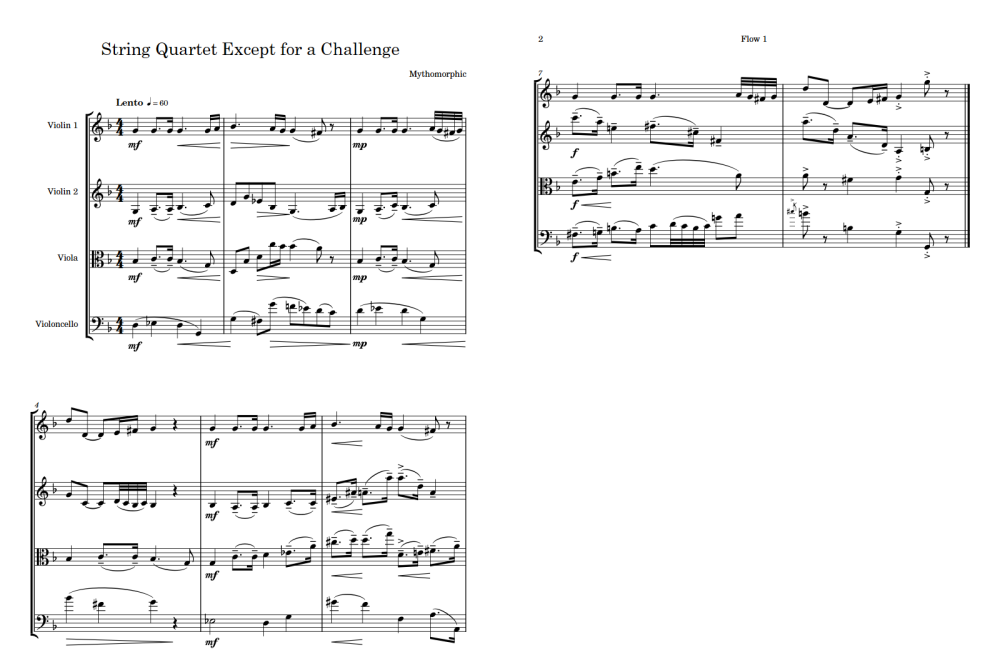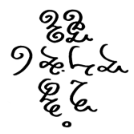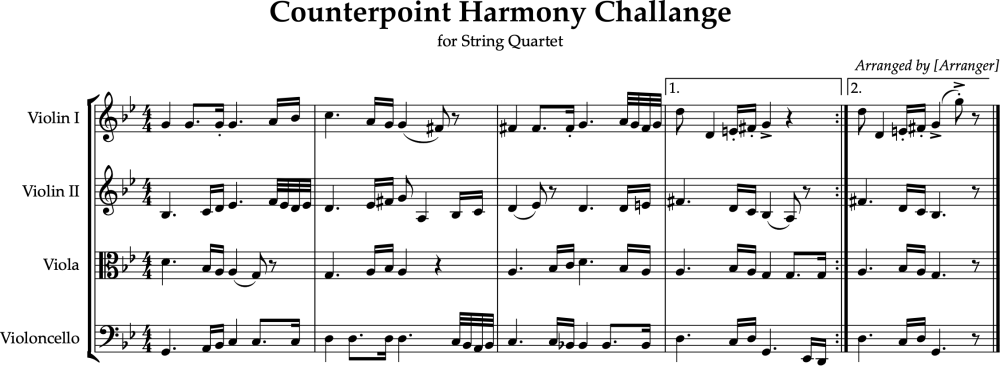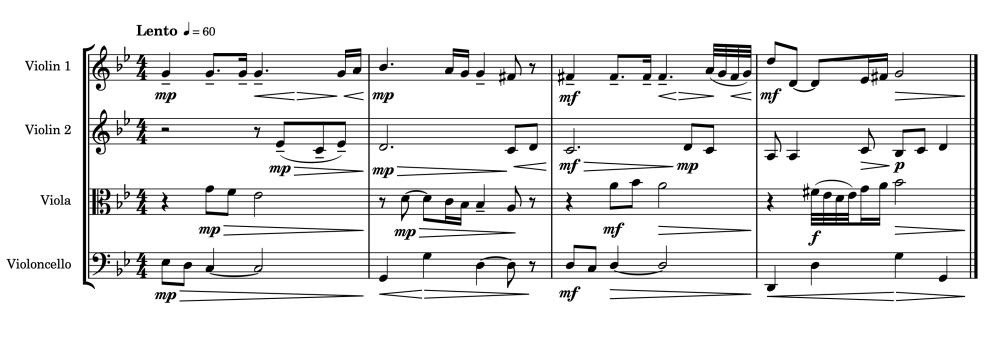Leaderboard
Popular Content
Showing content with the highest reputation since 06/25/2025 in Posts
-
Getting back into composition from a long hiatus, I decided to orchestrate a piano piece by Claude Debussy. The piece is a movement from his piano suite Estampes titled La Soireé dans Granade (Evening in Granada). I'm still not too familiar with Debussy's piano music as a whole, but this suite definitely piqued my interest in that genre. I wasn't aware at the time, but several high profiled figures have orchestrated this movement (and other movements of the suite), and I did avoid listening to them so I don't copy them. Link to the original piano composition: The audio quality is a little meh...this is the last piece I wrote before I switched out of Finale/Garritan to Dorico/NotePerformer. Any feedback is appreciated!3 points
-
3 points
-
I am also working on a set of variations and mash-ups on themes not written by me (from a famous videogame). I am using so many themes at once that I am also feeling unmotivated lately to work on it. It seems like one of those never-ending snowballing out of control projects. I hope that I'll finish at least one part of it. I think because of my ginormous orchestral project, the next thing I'll want to write is a piece for 1 monophonic solo instrument accompanied by 1 polyphonic instrument (like the Dreamscapes contest rules). It would be a nice change of pace. And if I manage to write something "dreamy" then it will be all the more interesting. Besides that I was thinking of writing my own variations of more of the themes from the "Bits to Bangers" competition, since I already did the "Harvest Moon" Piano Quintet. I think I majorly prefer working on previously written video game themes, and if not that, then I prefer for my own music to retain a VGM style or media purpose to it somehow.2 points
-
Am working on an Orchestral Variation on @PeterthePapercomPoser's themes. That's going to be my first orchestral piece and also first variation piece. One third of it has been finished but recently just sort oflosing the motivation a bit. I wanna write 2 serial piano pieces, and my life time goal would be to write a Choral Symphony using Chinese Poet's Du Fu's poems. Maybe I feel too tired working on many music these few months. Finishing a Piano Sonata, my dream the String Sextet which I feel so grateful to have finished, a Violin Sonata and a few piano pieces, maybe it's time for me to slow my pace down and absorb more music again. Henry2 points
-
Hi everyone! This is my first piece for full symphony orchestra, first post, (and my first "completed" composition: a lot of firsts), and I'm definitely still learning how to orchestrate better, create nicer textures, and pace my compositions/develop melodies (all for fun, I just like listening to music and playing a little bit haha, so I don't have any formal composition background). This piece was inspired by various Romantic composers (with quotes from my 3 favorite symphonies--one is really obvious but I'm interested to see if others will recognize the snippets I tried to include) and includes two central themes. I'm open to all the advice I can get! Thanks for your time! PS. my score is really chaotic and I still need to clean up all the accidentals and stuff.2 points
-
Nice piece! It makes me think of the C418 minecraft soundtrack. Yes, it does feel static, but personally I don't mind that at all. Although the best moments are when you break that staticness, like in bar 30-something with the sixtuplet. I like how you - when using the same chord for two successive bars - thin out / change the texture. Well done! Kind regards, Marius2 points
-
Hello @A Ko and welcome to the forum! It's so fun that you snuck in some themes from other composers' works! At around 4:10 it sounds like you're quoting Mahler - Symphony 4 or 5 perhaps? It's amazing that your first finished composition is this long and for orchestra - congrats! Incorporating other composers' melodies in your own works smoothly and seamlessly is quite a difficult endeavor and it gives the listeners a fun little Easter egg hunt to go on - very clever idea to involve the listener in the listening process in yet another additional way! Thanks for sharing!2 points
-
2 points
-
Hi! I'm new as well. I really like your piece - it has wonderful harmonic turns, it feels very well thought out. I especially like the really smooth key changes, and the part after b.24. The melodies are less recognisable, but I think it kinda suits the style. I think the playability is something you could work on (if you ever want a real orchestra to play it). First of all I'd try to change the key: probably to Eb and D instead of Db and C. You'll run into range issues doing that, but no-one likes playing with 5 flats. Whereas 3 flats is really nice for the winds and two sharps are nice for strings. Furthermore you might want to keep in mind that ppl need to breathe.. I'm mostly talking about the last note in the horns - I think it's possible, but it is a veeeery long note and also playing that pianissimo will only make it worse - you risk the sound getting quite shakey bc they'll be out of breath, and that will be very audible because no-one else is playing. Also the accel. from b.30 onward will be difficult to keep consistent. When performed it won't be as gradual as when done by a computer. Idem for other long gradual tempo changes. But for a professional orchestra these things would be entirely possible. And musically it's really good. I should say I don't have much experience reading scores or conducting so I don't know if this would be balanced at all - although I think so. My favourite moment is b.55 - really nice melody there! Kind regards Marius P.S.: Gershwin was really obvious. I think I heard some Sibelius 2 (mvt. 4) with that syncopated background and rising melody, but I'm not really sure. I didn't catch the third quote.2 points
-
What are you working on at the moment? What do you still want to compose?1 point
-
been working on a Choral-Orchestral Theme and variations on a two motives D-F-E-C and G-A-F-E Way to much stuff that I want to compose in the future though1 point
-
Thank you so much, Peter! I always appreciate the feedback. I had not thought of the BTTF theme comparison, but I completely hear it! Thanks for listening! I have been working on a piece (still VERY WIP) that I am planning on sharing here in the forum. Did more exploring of tools, settings, and more and have produced what I would describe as a suite. Haha! Will share soon!1 point
-
"Lion Heart," was written to describe the 12 Day War that is happening. I came up with my own system of modulating serialism: Home | Music Set Modulator The modulations work very well, giving the atonal music a sense of perspective and direction. The twelve day war opens with a trumpet fanfare, in response the upper woodwinds copy what the trumpets had said. After the initial statement, the music modulates to another tonal center. While the set modulates, it is not a direct transposition. Modulation is dynamic. The whole song is very percussive, like a machine gun bursts in some areas, bombs dropping in other areas, intermittent with lyrical rational between the instruments. Just when you think the twelve day war is over, a final percussive drive is offered. The form is closer to rondo, though the piece is sectioned symmetrically with an adagio section in the middle, according to the piano score. Much changes were made in the wind ensemble arrangement, which I will have a score soon. LionHeart.mid1 point
-
Hi @luderart, The texture in these 3 Sententiae reminds me very much of the parallel organum, and I like the serious mood in it. For me the time signature of the 1st one may be marked in a compound meter so that the triplets signs can be replaced? Thx for sharing! Henry1 point
-
As stated in the title, this perpetual canon follows all diatonic intervals of the key of B-flat major, as every entry begins on a different degree of the major scale as a tonal transposition of the canon's theme. Since every voice enters while alternating between strong and weak beats as displaced accents, this canon could also be described as "per arsin et thesin", so to speak. Enjoy! YouTube video link:1 point
-
Hi @EnriqueMZ! Nice March! Maybe for me I would vary the rhythm a bit at the latter half, or change the accompaniment for bars after b.17 to dotted rhythm as well for a more exciting mood. Thx for sharing! Henry1 point
-
Precisely because of the issues presented by the MuseScore 4 soundbanks I had to remove the cello's initial staccato. It made that single quarter note sound way too strong and became unwieldy when trying to get the playback functionalities to work properly. In any case, thank you kindly for all your feedback, including that which you gave for my other relatively recent compositions.1 point
-
Hi to everyone. This week I've been working on an exercise to orchestrate Debussy's Prelude No.6 from Book 1. I came up with two versions, one with a very restricted instrumentation, and the other with a larger ensemble. Interested to know which you think works best? The final bass dyad was very problematic, due to its extreme low pitch. It sounded too intrusive and twangy in the harp, and seemed off-pitch in the double-bass, with a horrible grating timbre. Eventually I decided to remove the lowest note altogether in the version with restricted instrumentation, and have the upper note pizz. instead of arco.1 point
-
A Piece of Me, for You.pdf A Piece of Me.mp3 Despite the simplicity, I think this one turned out absolutely awesome. it was inspired by some... for lack of better words... interestingly put together scoring done by a novice user on the Musescore platform. The only thing that is anywhere near the same is the feel I thought he was goin for, and the key of Ab Major being used, with emphasis on the Major 7ths. (Which I love so so so much. Me and Major 7th chords talk with one another often... hehe) Hope you all enjoy. Let me know what you think! IF anybody wanted to pick up the piece to play it, please please please feel free to do so, I just want a recording of it 😅 😅 😅1 point
-
Hey Peter my boy! Since you have listed out your really detailed review in point form, I should reply by point form too! 1. That is called RUBATO man!!😜 2. That's what I love in Beethoven's music too haha! I think the muddy texture is what caused the next passage to be "confused" when your mind goes muddy! 3. I love it too! That same falling fourth motive is from the beginning of the whole sonata! I think I learn this kind of German sixth progressions from Brahms. 4. I love that too, I think I am inspired by b.108 in the 1st movement when I did the same there! 5. Well not only here, but also in point 11 I only have a 1-bar transition to another passage. I would say I want these two abrupt transitions to show how confused I was at that time, but maybe they did sound too abrupt. Though I liked the effect, as if I didn't I won't retain them haha! 6. It IS difficult to play, the fingerings there are very weird to play with, but for my beloved C# minor I HAVE NO CHOICE haha. 7. Yeah that Locrian inflection here and also in the blues section comes exactly from the opening of the second movement! 8. I like that too, as I find it a bit difficult to transit reasonably with the change of style! 9. Haha yeah that melody is from the falling fourth motive of the 1st movement. This passage is hard to play with in order to emphasize that falling fourth motive in between the crazy dotted rhythms. 10. Yup the juxtaposition shows how conflicted I was then. That question like phrase is more questioning myself as I always do in my whole life lol. 11. That sweet melody comes from nowhere lol, though it's combined with the first theme of the 2nd movement at the very coda in counterpoint. That theme was born when I was having a walk. Initially I doubted whether I should introduce a new theme in the development of a final movement of a Sonata, but I just couldn't discard it given how beautiful that was, so I just retained it. 12. Yeah I don't like having the right hand playing the melody all the time haha, especially after my chamber music training. 13. Haha yeah I understand, because that passage sounds unrelated to any existing material of the whole Sonata. Though that is the passage which gave me confidence back in composing and by composing that I knew I could write good music again. It's devilish hard to play as well! 14. Yup I was more conflicted there too so I introduced the juxtaposition of material AND tempo too. Just like the ending of the 1st mov of Bee's op.130. 15. It's not from the Sextet, but rather from the second movement of this Sonata with the pentatonicism. I even quote that theme here too! 16. Yup I was conflicted whether to end the piece in a more peaceful way or tragic way, but this is my answer as I couldn't lie to myself and forced a fake Picardy 3rd ending as in many Romantic Sonatas. Thx for your review! Henry1 point
-
Hey @Mooravioli! I never mind you taking long for replying, given that you finally do reply haha! Truly appreciate it! Thx for your repeated listenings! Yup you said all I thought in the piece. Well you are right to observe that the random pauses interrupt the flow, because that's my intention. For me the blues are just escape lands of Utopia that needed to be interrupted by the real reality particularly in the recap section when I was already more awakened than in the exposition! I realized it was futile to escape imaginarily. Haha I actually love the bluesian Fx! Thx! Yeah all the anguish and pain worths after I finish my Sextet, it's a once-in-lifetime to have completed it in this perfect (I think) way. Thank you! Henry1 point
-
Hi @Alex Weidmann! Love your orchestration especially that contrabassoon. I think adding con sordino for the strings will make another timbre for the quiet sound. Thx for sharing! Henry1 point
-
Sometimes between writing my more complex and difficult to write music, I write something that is easy. This is one of those pieces, and I just felt like sharing.1 point
-
Yes, the intent was to be more static in the creation. As recently I’ve been trying to work on my form and trying to be careful with ensuring that the melodic / harmonic voices are distinct from one another, as I have been told in previous pieces that I tend to blur the line between them at times. plus, I believe that soft/heartfelt pieces express much of their beauty within their simplicity. “Less is more” is how I see it with this sort of theme. Allowing the sound of the instruments to breathe in the air for a moment, and giving the room a chance to carry sound, in my opinion, impacts an audience better than if there was fluently complex chord structures, and limited breaks between phrases. 🙂 PS id also like to point out that this sort of theme is quite different from my typical stylistic choices when it comes to composing. So was really dipping my toes in the water with this one. I’m usually writing in a more “Adagio” or “Andante” style, rather than “Grave” or “Larghetto”1 point
-
Yeah sorry tried to do it on my phone and it broke and I couldn’t fix it. 🤣🤣🤣🤣1 point
-
This is quite good for a first attempt at orchestral writing! I definitely hear allusions to other composers' works (Mahler, Dvorak, and Sibelius come to mind...with a hint of Bruckner). I do take issue with the title of the piece. When I think "Rhapsody", I expect something a little more virtuosic...doesn't have to be "fast", but needs more ornamentation and something show-off-y. I would call this maybe an "Orchestral Fantasy" due to its episodic form. Orchestration is a little odd for winds. You can probably reduce the flute section to just 2 + piccolo. You can also probably reduce to 4 horns. Strange there are no trumpets or additional trombones. The scoring is a bit haphazard and confusing as you can't tell which wind part is suppose to play when (unless they are constantly doubled?) Also, I've never seen a horn part using the tenor clef (and for some reason its only in Horns 5/6).1 point
-
A beautiful piece. One observation: the accompanying pattern, where the final part of the bar consists of long notes, plus the fact that the melody is structured in one-bar “blocks,” makes it sound a little static. Also, the fact that it remains in diatonic chords the whole time.1 point
-
LoL nice self promotion 😛 Will listen to it when I have time Henry1 point
-
Just finish watching 'I'm Still Here': https://www.google.com/url?sa=t&source=web&rct=j&opi=89978449&url=https://m.imdb.com/title/tt14961016/&ved=2ahUKEwjBqIS0-JCOAxVNha8BHfHzC3MQFnoFCJABEAE&usg=AOvVaw3YLv-6DqJYJVjZlaaEP0Qb I would say, the best music in the film are not those from the pop music tracks, but rather from the agonies and screaming from the tortured...1 point
-
Hi @MJFOBOE, thank you for listening and your question! I like listening to a lot of late-romantic symphonies (Mahler, Sibelius), and I wanted to compose something that sounded natural to me. This piece tries to incorporate elements of symphonic works that I like (harmonies, chord progressions, etc.).1 point
-
This is a work in the post-romantic tradition ... yes, I hear the excerpts from other works. It reminds of the lush romantic scores of Erik Korngold. However, I have a question, what motivated you to compose this work in this style? Mark1 point
-
The orchestration is simple, yet effective. I like the sparseness of it all, and would not add in any percussion/keyboard instruments as suggested above. However, the instrumentation is a little odd, but it works for me. You should definitely remove those ppppp dynamics. For strings, I would recommend doing it all con sordino.1 point
-
Hey @Fugax Contrapunctus! Great idea! I really like how the canon starts on the dominant, making the F minor tonality only a later emergent property of the harmony arising from the counterpoint. I think the Musesounds strings are a bit difficult to deal with to get them to sound as intended. I wonder why you changed the articulation to staccato as each new voice enters when it wasn't staccato in the Cello? It would make the entry of each voice more obvious I think if they entered on a fully held quarter note. The beginning and ending of the canon, I think are the best parts. But the middle could really have used some space/rests in the line to imo to give the ear an occasional break from the barrage of constant melodic material that demands to be digested by the ears. Thanks for sharing!1 point
-
1 point
-
Hi @Fugax Contrapunctus! I think your hours of labor on this unusual subject really paid off! I think the subject and the counter-subject are really well matched with each other with one moving while the other rests on quarter notes. It creates a kind of question/answer dichotomy between the voices and increases their independence. I think this is one of the best fugues you've written and seems really mature and less mechanical. It's very fluid, natural and spontaneous. The only thing that bothers me is the ending on a feminine cadence. I felt like the last chord came too early and should have been reserved for the strong beat of the next (non-existent) bar. Thanks for sharing!1 point
-
Hey @Layne! Your harmony and main theme are full of tension! And the piece is saturated with the theme throughout. But you do have a contrasting middle section that doesn't use the main theme for a brief moment. I'm surprised nobody has mentioned this yet but your main theme sounds a lot like the theme to "Back to the Future", especially with the first 3 notes (F, Bb, E). Thanks for sharing!1 point
-
1 point
-
Hi @Fugax Contrapunctus! This perhaps makes me think of a slow funeral march with its metronomic regularity and depth of emotion. I usually try to try to steer clear of orchestrating stuff the way you've done here where the choir is basically just doubled by the strings and woodwinds. You seem to have made it work, but I wonder if that will translate to a real performance. Perhaps with a careful balancing of the orchestra and a formidable enough choir, the orchestra won't drown the choir out. But you seem to have deliberately omitted the brass which might have been too forceful for the venue and the nature of the music, so I guess it's best to leave them tacit. Thanks for sharing!1 point
-
1 point
-
lol I have never replied here!! Pabio you are just too nice, I already find some minor little flaws in the music 😜! But thank you so much for loving it so much!! I am sure I hope to strive for greatness in this music, though I don’t now whether it does achieve greatness or not. I just have so many things I wanna speak that hasn’t be spoken and they are all spoken here in this music. I thought of the tragedy of my friend, Ukraine, Gaza people (not the evil state) and humanity in general, the philosophical teachings my philosophy Professor and his teachers, Confucius and Kant taught, and just wanna express them out. This is the first time I truly don’t care whether the Sextet is well received or not, because I have already spoken out what I wanna speak and I know I have paid my 500% effort in composing this. I know I have no regrets writing this because I pour all my hearts and souls in it, and even if the product is not good enough, I still have no regrets because I probably won’t be able to do better. I am sure you will write your own work that you are satisfied very much with Pabio! I did keep dreaming that I would finish the Sextet one day even though it’s very, very, very difficult. I always think that you have to have new thoughts in order to have new sound and timbre, not the vice verse as the contemporary music composer claims. Thank you! I still enjoy very much what you commented on the 2nd movement of the Sextet!! Henry1 point
-
A new poetry from the same Laforgue I can post the poem here, which is a beautiful black diamond (an automatic translation but quite close to the meaning) As always at Laforgue, irony, tenderness, idleness of an impossible platonic love We know that he loved a young Englishwoman with no return, and I think it was she who inspired him his most beautiful pages, here in the evening of his short life. Thank you for your reviews and comments! Ah! tonight, my heart feels sick, my heart is with the Moon! O veils of silence, spread out your still lagoons; O rooftops, terraces, basins, loosened necklaces Of pearls, tombs, lilies, grieving cats — give praise To the Moon, our Mistress to all, in her glory: She is the Host! and silence is her ciborium! Ah! how good it feels, oh! so good and sweet, in the halo Of mourning around this finest diamond’s glow! O Moon, you may find me a bit romantic, But tell me — now and then, wouldn’t it be frantic To think — just between us, and only if you please — That I could be your Columbus, on my knees? Well, let’s not speak of that; let’s chant the midnight rite, Preserved in alcohol, steeped in your delights. Slowing down towards us, O weary City, Fibrous cell with broken organs, withered pity! Remember the centaurs, the cities now erased, Palmyra, and the snub-nosed sphinxes of Thebes the chaste; And what Gomorrah, beneath your Lethe lake, Hides catacombs in honor of barren Astarte’s sake! And how mankind, with his “I love you” clichés, Is much too anthropomorphic in his ways, And knows only how to muddle through his days With hellos and goodbyes while twisting love his way. — Ah! As I was saying, and more than once or twice, That my heart is sick — my heart is with the Moon, precise.1 point
-
Hello @L.S Barros, The piece does sound very English for me with all those colorful Picardy 3rds. I don't know if I mishear but I think I catch a parallel 5th in 0:31, maybe it's the organ sound. Thx for sharing. Henry1 point
-
I really like how it turned out. Both the sounds you used (the organ in particular, or whatever it is) and the composition itself.1 point
-
Hello @L.S Barros and welcome to the forum! Nice sonata! I assume (you can correct me if I'm wrong) that this is a sonata de camera? I love the constant exchange between major and minor mode that is so characteristic of music in this style, with all its Picardy 3rds (as I learned on your server). I do wonder how it would sound if you tried reversing the pattern - like, what if a phrase in a major mode ended on a minor chord? Or maybe you or some other Baroque-style composer already do this? I get the sense that this is a dance and is a piece that could easily be danced to in real life rather than just being a dance form that evolved out of an actual dance but is meant to be just an instrumental (which is why I'm guessing that this is a sonata de camera). Thanks for sharing and I hope you find this forum to be a good platform to share more of your works and participate by listening to other composers' works and possibly reviewing them! Kind regards,1 point
-
The final piece of my four Piano pieces set and just a lame joke. Can be developed into a postmodern minimalistic masterpiece by repeating the joke forever and forever...... Joke in A flat major.pdf Hope you enjoy this one! Henry1 point
-
Hi y'all, second post on this forum... Here's a piece I finished a while back. Hope you like it!1 point


.thumb.png.8b5b433a341551e913a34392660bc95b.png)














